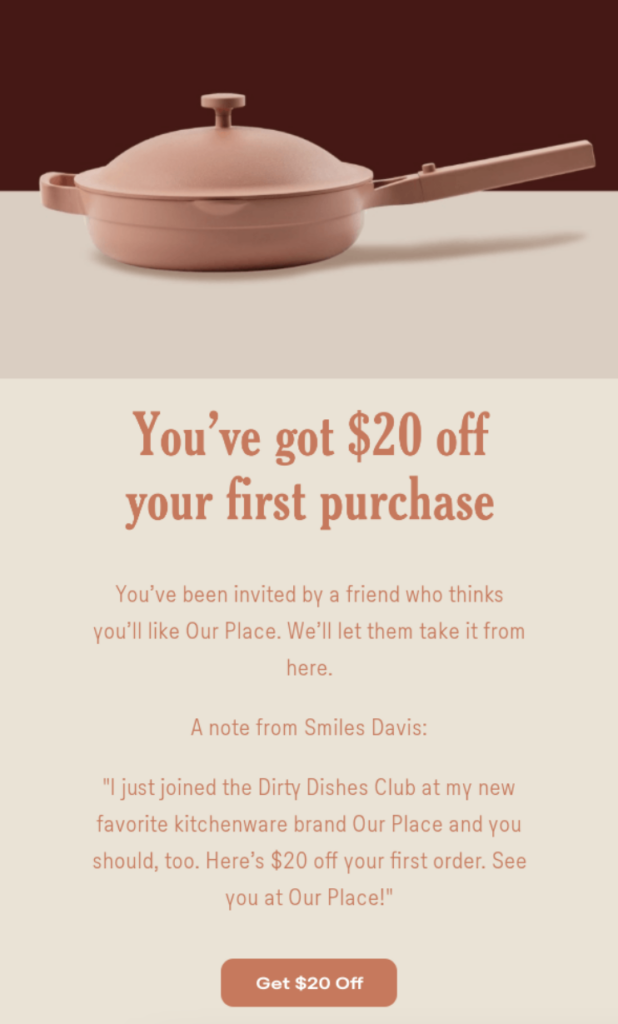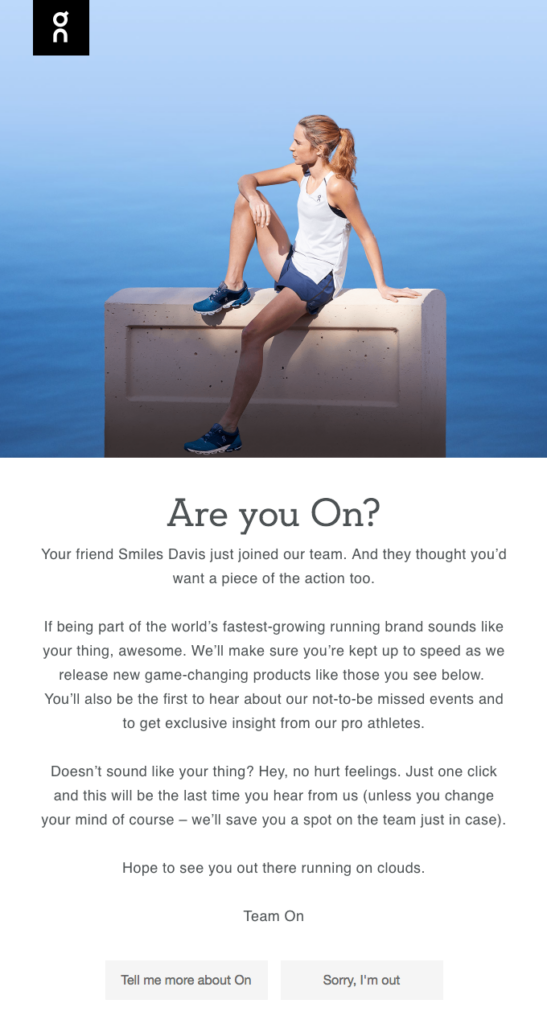Consumer needs are constantly changing, but one thing remains clear: your customers make major purchasing decisions based on recommendations from the people they trust.
That’s where referral cards come in. These cards act as extensions of your existing loyalty program, tapping into word-of-mouth marketing with a card your customers can easily share with their networks.
Referral cards used to just be physical cards you could hand to a pal (almost like a business card). Now, they’ve gone digital, letting friends share referral incentives – like a gift card, referral bonus, or cash back – from their favorite companies through SMS messages and email.
Let’s look at four examples of digital and physical referral cards and dig into what makes them effective.
1. Cariuma uses SMS to connect in real-time
Cariuma is a sustainable footwear company that focuses on sneakers created out of recycled materials.
The company’s referral program is similarly sustainably minded. Not only do the referrer and their friend each get $30 out of the deal, but the company also pledges to plant 30 trees when the offer is redeemed.
Its digital referral card comes in the form of an SMS message. When a customer opts into the referral program and shares the reward with a friend or family member, the system triggers a text message.
Cariuma’s standardized text message gets sent to the friend, sharing the deal and a link to easily redeem it.
Source: Attentive.com
Why Cariuma’s SMS referral card works
Consumers are turning more and more to businesses that have a strong company ethos. In the U.S., 70% of consumers want their favorite brands to be vocal about environmental and social issues.
Cariuma’s referral reward sparks loyalty by tying the program to a company value that is shared by its customers (sustainability) and a special discount toward its product.
Plus, more and more companies are turning to SMS messaging to connect with their customers – because it works.
In a recent survey on the state of SMS marketing, 81% of respondents reported that they’ve subscribed to a company’s SMS messages. Even more, 63% of those subscribers made a purchase through a text message alone.
These messages go directly to a customer’s phone and, like email, work in real time. No algorithms to hack and no complicated (and often messy) tactics to beat out the competition for higher engagement.
2. Our Place personalizes referral card messages
If you’ve been in the market for trendy and ultra-functional cookware, chances are you’ve come across Our Place. The company’s Always pan went viral in 2021 and now boasts over 27,000 5-star reviews.
The company’s referral program is pretty straightforward: Give $20 to get $20 off your order.
Once a customer makes the decision to refer a friend, the company automatically sends an email letting the friend know they have access to a special offer. The referring customer gets access to the offer as soon as their friend completes their first purchase.
Source: ReallyGoodEmails
Why Our Place’s referral email card works
Our Place’s email offer also comes with a personalized message from the referrer.
The company knows that at this point in a new customer relationship, the recipient is more likely to trust a friend rather than a faceless company, so it passes the mic.
The line “We’ll let them take it from here” taps into word-of-mouth marketing, specifically, the growing trend of peer-to-peer (P2P). P2P is based on the idea that people are more likely to buy from other people rather than a brand.
Personalization is also a growing demand from younger audiences, like Gen Z and millennials. Nearly half of U.S. consumers claim they are more likely to become repeat buyers from companies that personalize their shopping experience.
Personalizing a referral offer makes it feel more special. Plus, since the offer comes from a person the recipient trusts, it helps them connect to the brand faster.
3. Aveda offers customers gift cards for referrals
Cosmetics and salon brand Aveda is known for its cruelty-free products and exclusive brand.
With Aveda’s referral program, customers get a $25 gift card toward salon products for every successful referral they make. The referred customer gets $20 off their service.
Source: AvedaMeansBusiness.com
Why Aveda’s referral card works
Aveda’s referral cards go beyond simply gifting products; they offer an experience – and Aveda knows a single positive customer experience can turn newcomers into loyal customers.
Hair stylists typically give clients a reminder card with the date and time of their next appointment. Aveda has gone one step further, using the appointment card format customers are familiar with and including a referral offer.
Plus, because salons already print cards as appointment reminders, it’s a budget-friendly, low-lift initiative to add a referral message.
4. On taps into social proof
On sells tech-focused footwear and activewear designed to create the illusion of “running on clouds.“
For its loyalty program, the company takes a slightly different approach than the others on our list. When a customer refers their friends, On takes time to first educate them about the company. Only after the person has opted in does On then share information about its loyalty program.
Source: ReallyGoodEmails
Why On’s email referral card works
On’s tactic for its loyalty program is to generate interest based on social proof – the idea that people’s purchasing decisions are influenced by others.
On’s email copy is written specifically to engage the reader based on the idea that lots of people already love this company, so they should, too.
The message begins by telling the reader exactly who sent them the offer. This lets the reader know one of their friends already loves the company and wants them to experience it as well.
Then, the company hypes itself up to let the reader know it’s fast-growing and responsive to its customers, aka lots and lots of people love its products. Plus, it makes a promise to give the reader exclusive access to events and insights from pro athletes.
It wraps up by letting the reader know they have an easy out. This makes the experience feel low-stakes and gives the reader control over whether or not they want to participate.
By asking the reader to specifically opt out of the loyalty program, On gains a data-based opportunity to learn why consumers would choose not to join. This helps it refine pain points and create a better experience over time.
Referral cards keep you top-of-mind with loyal customers
Think about it this way: referral cards act like thank-you cards before a new customer even makes a purchase. They feel valued by your brand before they’ve even added something to their cart. That’s a stellar way to kick off any new relationship.
As we’ve seen in these examples, the best referral card ideas are the ones that keep you in the minds of your customers. That means sending cards through real-time means, like SMS and email, and (if it makes sense for your company) physical cards your customers can hand over to their friends.
Extole’s customer-led growth marketing tool is specifically designed to help brands form deeper connections with their existing customers while tapping into new, highly actionable audiences.
Schedule a demo to learn more.








